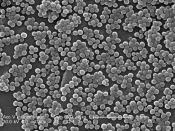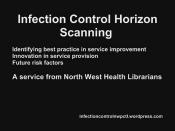The principle of infection control is something that is becoming increasingly important in hospitals and healthcare settings. This is primarily because of the hardship and suffering it causes to the patient who acquires an infection whilst in hospital and also because of the cost it brings to our already under funded hospitals from increased stays and healthcare workers falling ill.
The author will discuss the principal of infection control and by demonstrating the effectiveness of techniques such as hand washing and universal precautions will determine its relevance. One of the major infections acquired in hospitals, urinary tract infections will also be explored and by referring to relevant research the author will investigate its preventability.
For some infection control is the latest buzzword on hospital wards, however, its significance is somewhat overlooked. Hospital acquired infections (HAI), which are a result of poor infection control account for around 10% in the UK, to date there are no accurate figures for Ireland but it is reckoned to be the same (Rogers, 2000).
According to Rizzo (1999), a HAI is usually one that first appears three days after a patient is admitted into hospital. They are also called nosocomial infections. Germany differs somewhat to the occurrence of HAI's as they have had a holistic strategy in hospital hygiene since 1976 which has resulted in the lowest rates of infection amongst patients compared with the rest of Europe (e.g. Germany 3.5%, France 6.7%, UK 10%) (Exner, Hartemann and Kistemann, 2001). It is because of infection control that since the beginning of the 20th century life expectancy has increased by more then 30 years along with life quality. The main reasons for these results are improvements of the economic situation of the population, housing and domestic settings, nutritional status, education, motivation to perform personal hygiene, centralized...


